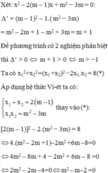Hãy nhập câu hỏi của bạn vào đây, nếu là tài khoản VIP, bạn sẽ được ưu tiên trả lời.

Ta thấy các hệ số \(a,b,c\) của phương trình đã cho thỏa mãn \(a-b+c=1-\left[-\left(m-3\right)\right]-m+2=1+m-3-m+2=0\)
nên phương trình đã cho sẽ có một nghiệm là \(-1\) và nghiệm kia là \(m-2\).
Trong hệ thức \(x_1^2+x_2=8\), vai trò của \(x_1,x_2\) không như nhau nên ta xét 2 trường hợp:
TH1: Nếu \(x_1=-1\) thì \(x_1^2+x_2=8\Leftrightarrow\left(-1\right)^2+m-2=8\Leftrightarrow m=9\).
TH2: Nếu \(x_2=-1\) thì \(x_1^2+x_2=8\Leftrightarrow\left(m-2\right)^2-1=8\Leftrightarrow\left(m-2\right)^2=9\) \(\Leftrightarrow m-2=\pm3\) \(\Leftrightarrow\left[{}\begin{matrix}m=5\\m=-1\end{matrix}\right.\).
Vậy để phương trình đã cho có 2 nghiệm thỏa điều kiện đề cho thì \(\left[{}\begin{matrix}m=-1\\m=5\\m=9\end{matrix}\right.\)

\(a,m=3=>x^2+3x-2=0\)
\(\Delta=3^2-4\left(-2\right)=17>0\)
pt có 2 nghiệm pb \(\left[{}\begin{matrix}x1=\dfrac{-3+\sqrt{17}}{2}\\x2=\dfrac{-3-\sqrt{17}}{2}\end{matrix}\right.\)
b,\(\Delta=m^2-4\left(-2\right)=m^2+8>0\)
=> pt đã cho luôn có 2 nghiệm phân biệt x1,x2 với mọi m
theo vi ét \(\left\{{}\begin{matrix}x1+x2=-m\\x1x2=-2\end{matrix}\right.\)
có \(x1^2x2+x2^2x1=2014< =>x1x2\left(x1+x2\right)=2014\)
\(< =>-2\left(-m\right)=2014< =>m=1007\)
a) Thay m=3 vào phương trình, ta được:
\(x^2+3x-2=0\)
\(\Delta=3^2-4\cdot1\cdot\left(-2\right)=9+8=17\)
Vì Δ>0 nên phương trình có hai nghiệm phân biệt là:
\(\left\{{}\begin{matrix}x_1=\dfrac{-3-\sqrt{17}}{2}\\x_2=\dfrac{-3+\sqrt{17}}{2}\end{matrix}\right.\)

Lời giải:
Để PT có 2 nghiệm $x_1,x_2$ thì:
$\Delta'=(m+1)^2-(m^2-1)>0\Leftrightarrow 2m+2>0\Leftrightarrow m>-1$
Áp dụng định lý Viet:
$x_1+x_2=2(m+1)$ và $x_1x_2=m^2-1$
Khi đó, để $x_1^2+x_2^2=x_1x_2+8$
$\Leftrightarrow (x_1+x_2)^2-2x_1x_2=x_1x_2+8$
$\Leftrightarrow (x_1+x_2)^2=3x_1x_2+8$
$\Leftrightarrow 4(m+1)^2=3(m^2-1)+8$
$\Leftrightarrow m^2+8m-1=0$
$\Leftrightarrow m=-4\pm \sqrt{17}$. Vì $m>-1$ nên $m=-4+\sqrt{17}$

\(\Delta'=\left(m-5\right)^2+2m-9=m^2-8m+16=\left(m-4\right)^2\ge0;\forall m\)
Pt đã cho luôn luôn có nghiệm
Theo hệ thức Viet: \(\left\{{}\begin{matrix}x_1+x_2=2\left(m-5\right)\\x_1x_2=-2m+9\end{matrix}\right.\)
Do \(x_1\) là nghiệm của pt nên:
\(x_1^2-2\left(m-5\right)x_1-2m+9=0\Rightarrow x_1^2=2\left(m-5\right)x_1+2m-9\)
Thay vào bài toán:
\(2\left(m-5\right)x_1+2m-9+2\left(m-5\right)x_2=4m^2\)
\(\Leftrightarrow2\left(m-5\right)\left(x_1+x_2\right)+2m-9=4m^2\)
\(\Leftrightarrow2\left(m-5\right).2\left(m-5\right)+2m-9=4m^2\)
\(\Leftrightarrow-38m+91=0\)
\(\Rightarrow m=\dfrac{91}{38}\)


Lời giải:
Để pt có 2 nghiệm thì $\Delta=(m-3)^2-4(-m+2)\geq 0$
$\Leftrightarrow (m-1)^2\geq 0$ (luôn đúng với mọi $m\in\mathbb{R}$)
Áp dụng định lý Viet:
$x_1+x_2=m-3$
$x_1x_2=-m+2$
$\Rightarrow x_1+x_2+x_1x_2=-1$
$\Leftrightarrow x_1+x_2+x_1x_2+1=0$
$\Leftrightarrow (x_1+1)(x_2+1)=0$
$\Leftrightarrow x_1=-1$ hoặc $x_2=-1$
TH1: $x_1=-1$
$x_2=\frac{-m+2}{x_1}=m-2$. Khi đó:
$x_1^2+x_2=8$
$\Leftrightarrow (-1)^2+(m-2)=8$
$\Leftrightarrow m=9$
TH2: $x_2=-1$
$x_1=\frac{-m+2}{x_2}=m-2$. Khi đó:
$x_1^2+x_2=8$
$\Leftrightarrow (m-2)^2-1=8$
$\Leftrightarrow (m-2)^2=9$
$\Leftrightarrow m-2=\pm 3\Leftrightarrow m=5$ hoặc $m=-1$